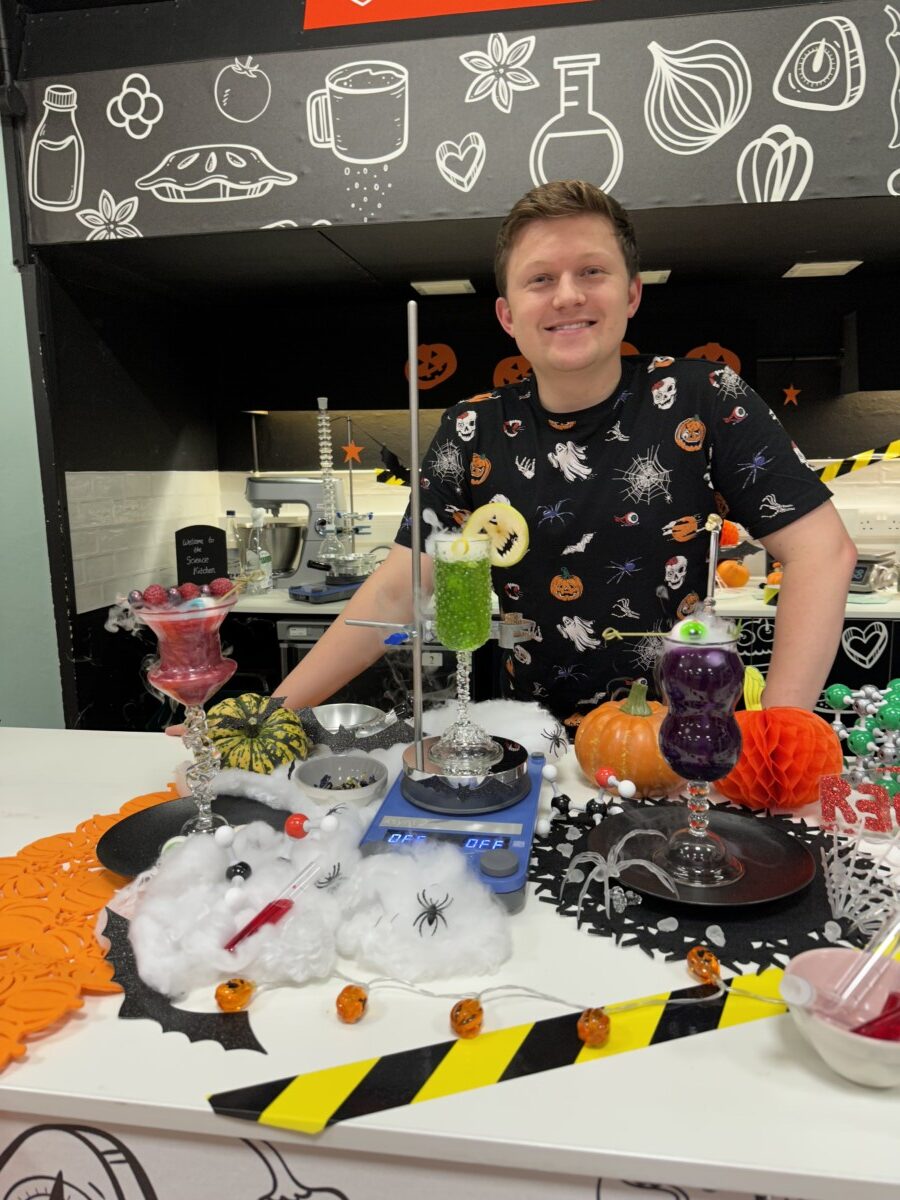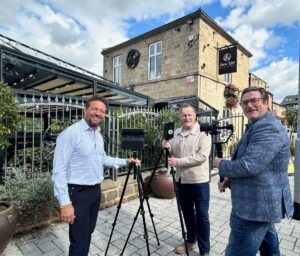Q&A: Bake Off finalist Josh Smalley on science, baking and why perfection isn’t everything

“Baking is just another form of science – but it’s also about joy, creativity and connection.”
British Bake Off finalist Dr Josh Smalley will be bringing his passion for science and baking together in a special Halloween-themed talk at New Scientist Live this October. Ahead of the event, he shared his memories of the tent, lessons learned along the way, and how chemistry shapes his creations in the kitchen.
What inspired you to finally take the plunge and apply for Bake Off?
I’ve loved Bake Off for as long as I can remember and always dreamed of stepping into that iconic white tent. My friends and family had been persuading me for years, and I finally applied back in 2019 at the start of my PhD, and again in 2022 – this time inspired by my Nan, who we sadly lost to lung cancer in June 2021. She was my biggest baking supporter. Every time I baked, I’d take something to her house for us to share with a cup of tea. She had encouraged me to apply back in 2019, and in her memory I wanted to try again and do her proud. I promised her I would give it another go.
Baking has been part of my life for as long as I can remember, and as a chemistry researcher I’ve been fascinated by the overlap between my two passions. For me, baking is another form of science: during the week I experiment with reagents in a lab, and at the weekend with ingredients in the kitchen. With years of experimenting behind me, I’d always dreamed of testing myself on the Bake Off stage.
Meeting Paul Hollywood and Prue Leith must have been a highlight – what were they really like in person?
Paul wasn’t nearly as intimidating as I’d expected – he was genuinely friendly and smiled far more than you’d ever imagine from watching him on TV! Prue was an absolute delight and reminded me so much of my Nan – calming and positive. It felt special to be able to present your bake to the two of them, knowing they were not only genuinely interested but also excited to taste it. The famous blue-eyed stare was there, though – I’ll admit I tried to avoid making direct eye contact whenever Paul came round to check on what I was doing!
With so many thousands of people applying each year, why do you think you stood out to be chosen?
Bake Off always puts together such a mix of people, and I think my science background helped me stand out. I also love variety – cakes, bread, patisserie – and I think that broad range, plus the way I try to tell a story through my bakes, played a part.
Bake Off has an incredible knack for bringing together such a fabulous line-up of bakers – 12 complete strangers of all ages, careers, and backgrounds, united by a shared passion for baking. Somehow, they always know we’ll instantly connect. In most series there’s often a scientist in the mix, and I certainly fit that role as a Chemistry Researcher at the University of Leicester!
I also love variety – cakes, bread, patisserie – and I think that broad range, plus the way I try to tell a story through the way I assembled and presented my bakes, played a part. While some bakers may specialise in cakes for example, I enjoy making everything from bread and biscuits to puddings and patisserie, so I think that broad range of skills played a part.
Was there anything about being part of the Bake Off process that really surprised you?
The sheer scale of it all. From 20,000 applications down to just 12 of us, you really appreciate how incredible it was for us to make it to the final 12. The build-up to that very first filming day was eye-opening. I was amazed at the sheer amount of work that goes into producing each episode – not just for us bakers, who were busy testing, tweaking and perfecting multiple recipes and presentation ideas, but also for the production team. Every single ingredient had to be sourced and ready on our benches at the crack of dawn, every prop and plate in its place, and an army of people on hand to wash up mountains of bowls and pans so the tent always looked immaculate. The precision and organisation behind the scenes was just staggering.
What struck me most, though, was how instantly our group of bakers clicked. From the moment we met, we felt like one big, happy family – supporting, laughing, and learning from one another. And that bond has stayed strong even now, 2 years later. It really showed me that Bake Off isn’t just about cakes and bread; it’s about people, friendship, and sharing the joy of baking.
What’s the biggest lesson you took away from Bake Off that you still carry with you today?
For me, one of the biggest lessons was learning how to manage time and let go of perfection. In the tent, you’re constantly juggling multiple elements of a bake at once, all under intense time pressure. The reality is that the final result will never be as flawless as something crafted over several days at home. As someone who has always strived for perfection, it was eye-opening to realise that perfection isn’t always possible, or even necessary. Instead, I learned to focus on making the best decisions in the moment, ensuring I delivered the strongest bake I could within the time I had. That mindset shift has stayed with me far beyond the tent.
Were there moments in the tent where you felt that your chemical background gave you an advantage?
Definitely! I approached recipe testing at home the same way I would optimise an experiment in the lab – systematically tweaking ingredient ratios, flavours, textures, oven temperatures and timings, then carefully documenting the outcomes before reviewing which gave the best result. That experimental mindset really helped me refine my ideas before stepping into the tent. Once the challenges began, my background as a chemist came through in how I organised myself. Just as I would set up an experiment with precise measurements, clear step-by-step plans, and strict timings, I applied the same discipline to baking. That structure and attention to detail made it much easier to stay calm under pressure and deliver a finished bake within the tight time limits.
People often call baking “edible chemistry” – where do you see the balance of science and creativity in the kitchen?
For me, the beauty of baking is that it’s where precision and creativity meet. The science gives you the overall structure, understanding the ratios, reactions, and processes so your bake works as it should, providing reliability and consistency. But once you’ve mastered that foundation, the artistic side takes over in how you decorate and tell a story through the bake, giving it its individuality. On Bake Off, I loved that balance, using my chemistry background to get the technical side right, then layering in artistry to bring the bake to life and make it my own.
Your New Scientist Live talk mixes Halloween baking with science – what can visitors look forward to on the day?
I’ll be serving up a range of science experiments that put a spooky twist on baking. Expect everything from the chemistry of pumpkin spice, to the molecular mysteries behind Halloween bakes. I’ll be bringing a pumpkin to life, doing eye-popping colour-changing experiments and using powerful microscopy to zoom in close on ingredients, plus maybe a creepy crawly or two. I’ll be reviving one of the University of Leicester’s oldest recipes, discovered in a manuscript from the late 1700s, and giving it a makeover with a Halloween twist
Any tips for aspiring bakers and scientists in the audience take away from your session?
That science is everywhere – even in your kitchen. Baking is such a fun way to experiment and learn important scientific principles. I hope it inspires young people to be curious and creative and make them see that science is fun and accessible, not just something in textbooks. If they leave feeling excited to ask questions, test ideas, and experiment in the kitchen, then I’ll know I’ve done my job!
What would your ultimate science-inspired showstopper bake be?
My ultimate science-inspired showstopper would have to be Christmas themed, as after all, I’m known as “Dr Christmas” in December and own over 70 festive jumpers! I imagine a towering biscuit “Christmas Chemist-tree” made from gingerbread, decorated with elaborate royal icing piping and adorned with stained-glass biscuit ornaments, delicate blown-sugar baubles and various chemistry-inspired edible decorations.
Josh Smalley is speaking at New Scientist Live which takes place on October 18-19 at ExCeL, London. To book tickets visit: New Scientist Live 2025 – Ticket types
About New Scientist: New Scientist is the world’s most popular weekly science and technology publication, with readers across the globe. New Scientist Live is its flagship annual event, bringing together trailblazing experts, future-focused brands and science-curious visitors for a weekend of discovery and inspiration.





